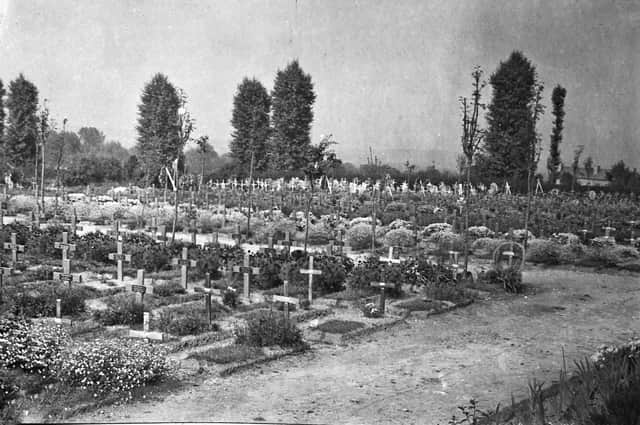Father's pilgrimage to the grave of a Lancashire war hero


Lance Corporal John Albert Morris was killed on November 1, 1916 aged 23 while serving with the Royal Fusiliers.
On the fifth anniversary of his death, his father George, travelled with L/Cpl Morris’s widow Jane from his home in Ashton Road, Blackpool, to visit his only son’s grave in Grove Town Cemetery, Meaulte, in France.
Advertisement
Hide AdAdvertisement
Hide AdIn his own words this is Mr Morris’s record of their visit: “We travelled under the auspices of the Salvation Army (SA), who have a really fine organisation to help friends visiting relatives’ graves. The SA arrange for your passports, book your ticket through to the nearest hostel to the cemetery, which in our case was Amiens, a city that was the objective of the German attack of 1918.
“Our port of embarkation was Folkstone, and on arrival at Boulogne an SA officer is on the quayside to take you to a hostel for lunch, after which you are taken to the train and seen safely off to Amiens. Another officer meets you at the station there and conducts you to your resting place for the night – the Amiens Hostel – this after 12 hours’ journeying from London.
“You partake of dinner, the officers get particulars of the cemetery you wish to visit, a short service is held in the drawing room, which you may attend of you wish, and afterwards you retire to rest to prepare you for the journey on the morrow.
“The consideration and kindness you receive is wonderful. Your mission is a sad one, but it is eased as much as possible. You put yourself into the hands of the SA officer there, and you could not be in better hands. Experienced and able, putting the religion of Jesus into actions, nothing seems too difficult, nothing too taxing.
Advertisement
Hide AdAdvertisement
Hide Ad“Their love for the work, their sympathy for you in your loss, carry them a long way. This is one instance of their unfailing kindness. A mother arrived at the hostel while we were visiting there. She had not the necessary particulars, such as the name of the cemetery etc. She only knew that her son was buried near Rheims.
“Starting about 4.45 in the morning an officer accompanied her to Rheims, about 100 miles train journey, they took a car at Rheims and visited five cemeteries, scrutinised the little wooden crosses in each and arrived back in Amiens at about 12.45 in the morning.
“The day had been tremendously hot. They took refreshments with them, but were unable to get even a cup of tea, and the officer’s only regret was because he had not been able to find the grave of the boy the mother loved so well and he wondered how the mother had been able to keep up during that tremendously tiring day.
“After breakfast arrangements are made for you to proceed to your cemeteries, sometimes by train but mostly by motor wagonette, which did much service during the war as a motor ambulance.
Advertisement
Hide AdAdvertisement
Hide Ad“The cost of motoring is heavy. The distances are great. You make up a party of 8 to 10, and share the expenses. You may have gone over that devastated area of the Somme to the extent of 100 miles, and have visited eight or more cemeteries. Some of the roads are good, very good, some are bad, very bad. Sometimes the roads are being re-made .
“A word about the man in charge of the motor . He has traversed the roads in this Somme area for two seasons, visiting several cemeteries nearly every day, and what he doesn’t know about the Somme region is not worth knowing. And what a beautiful spirit he possesses. The tender kindness and love which he manifests is touching and consoling.
“He takes you to the sacred spot, digs up the earth with his tyre lever; and, while the mourner stands there overcome with the thoughts of a great loss – that the loved boy lies there who left home so brightly, promising to be back soon to look after mother, or the loving husband so strong, so loving, so kind, whose not returning had made so great a void in that woman’s heart and life – fixes the wreath, or plants the roots, brought from old England, photographs the grave with the little wooden cross, and then says: ‘Mother, shall we have a word of prayer’.
“And so we gather around the sacred spot while this young man pours out his soul to his God , praying that strength may be given to the mourning wife or mother that they may imitate the example of the loved one lying there and put up a good fight until the reunion in the better land.
Advertisement
Hide AdAdvertisement
Hide Ad“This young man, with his wife, is coming to live at Blackpool, and Blackpool will be the richer but only one or two will know that this unassuming fellow has followed in the footsteps of his Master so closely that he lives in the hearts of thousands whose burden he has lightened when first they have visited their loved one’s grave.
“While you cannot spend much time at the loved one’s grave, still you have been and paid your tribute to the brave dead, any feeling of satisfaction you have is difficult to define. You have sympathised with others on the same sad errand, and they have shared your sorrow.”
This article is an edited version of a feature first published by the Fleetwood Chronicle on November 4, 1921.